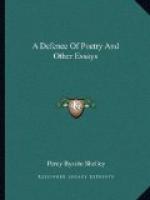They omit, indeed, to calculate upon the accidents
of disease, and temperament, and organization, and
circumstance, together with the multitude of independent
agencies which affect the opinions, the conduct, and
the happiness of individuals, and produce determinations
of the will, and modify the judgement, so as to produce
effects the most opposite in natures considerably
similar. These are those operations in the order
of the whole of nature, tending, we are prone to believe,
to some definite mighty end, to which the agencies
of our peculiar nature are subordinate; nor is there
any reason to suppose, that in a future state they
should become suddenly exempt from that subordination.
The philosopher is unable to determine whether our
existence in a previous state has affected our present
condition, and abstains from deciding whether our
present condition will affect us in that which may
be future. That, if we continue to exist, the
manner of our existence will be such as no inferences
nor conjectures, afforded by a consideration of our
earthly experience, can elucidate, is sufficiently
obvious. The opinion that the vital principle
within us, in whatever mode it may continue to exist,
must lose that consciousness of definite and individual
being which now characterizes it, and become a unit
in the vast sum of action and of thought which disposes
and animates the universe, and is called God, seems
to belong to that class of opinion which has been
designated as indifferent.
To compel a person to know all that can be known by
the dead concerning that which the living fear, hope,
or forget; to plunge him into the pleasure or pain
which there awaits him; to punish or reward him in
a manner and in a degree incalculable and incomprehensible
by us; to disrobe him at once from all that intertexture
of good and evil with which Nature seems to have clothed
every form of individual existence, is to inflict
on him the doom of death.
A certain degree of pain and terror usually accompany
the infliction of death. This degree is infinitely
varied by the infinite variety in the temperament
and opinions of the sufferers. As a measure of
punishment, strictly so considered, and as an exhibition,
which, by its known effects on the sensibility of
the sufferer, is intended to intimidate the spectators
from incurring a similar liability, it is singularly
inadequate.
Firstly, Persons of energetic character, in whom,
as in men who suffer for political crimes, there is
a large mixture of enterprise, and fortitude, and
disinterestedness, and the elements, though misguided
and disarranged, by which the strength and happiness
of a nation might have been cemented, die in such
a manner, as to make death appear not evil, but good.
The death of what is called a traitor, that is, a
person who, from whatever motive, would abolish the
government of the day, is as often a triumphant exhibition
of suffering virtue, as the warning of a culprit.




